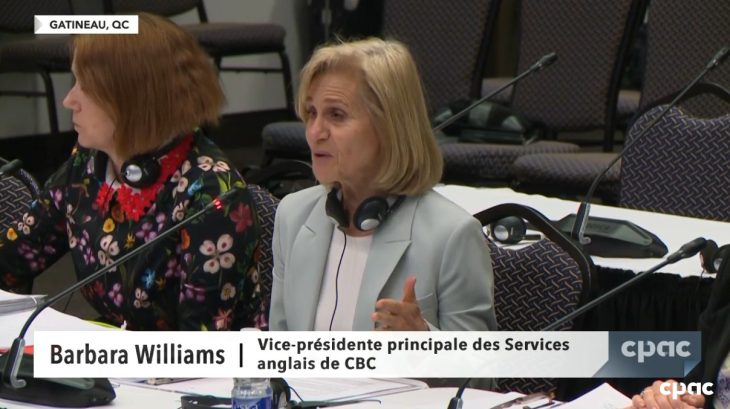
By Ahmad Hathout
Pushing back against the assertion that the public broadcaster should take up the mantle of at-risk programs where private broadcasters have struggled, CBC’s executive vice president said this must be a whole-of-system effort.
“We feel that we should not be seen as a gap filler for the problems of the other broadcasters – that where market forces don’t come easily to their decisions about programming – it shouldn’t just be assumed not to worry about it, the CBC will do it,” Barbara Williams told the five-member CRTC panel on the second-last day of its hearing into the definition of Canadian content for a modernized Broadcasting Act.
“The CBC will do some of it,” she continued. “We are obliged to do some of it by license condition, and we want to do it for that broader mandate purpose. But we know we cannot be the only ones serving up some of these at-risk genres. So we think it’s important for diversity of voices that everyone participates and it’s important that it’s understood that there’s going to be just lots of different creative ideas and distribution mechanisms and opportunities for audiences to discover content if everyone’s leaning into the unique opportunities of the Canadian system.”
Over the past couple of days, the CRTC has heard from major private broadcasters, including Rogers, Bell, and Quebecor, suggesting that the public broadcaster could be made to step up on the supply of certain at-risk programming, including children’s content that some broadcasters have struggled to maintain on traditional platforms.
Rogers, in fact, urged the CRTC not to try resolving the issue by creating new regulatory pathways or funds because it claims the situation is not made from market failure but is a market outcome of children leaving the traditional system and going online.
“The right response to an issue of decreasing demand is not to increase supply,” Dean Shaikh, Rogers’s senior vice president of regulatory affairs, said Friday. “There’s been a suggestion that because kids are leaving the traditional system, maybe we need to fund more or dedicate more funds to kids programming, allocate some CPE to kids programming.
“If you introduce a new fund or funding commitment or CPE commitments, you’ll be taking money away from things like local news that in our model, we would like to continue to support,” he added.
But Dany Meloul, executive vice president of Radio-Canada, disagreed on Monday. “Producers are correct in being concerned. That’s why I don’t agree with the Rogers premise, which seems to say that we have enough. On the contrary, we have to continue to fund and to support this sector.”
The CBC is a unique broadcasting institution in that it competes both with private broadcasters for advertising dollars and also receives public funding, which private companies believe is unfair and serves as a reason for the Mother Corp. to carry more of the burden.
“We are special, we are unique, and yet we’re part of the whole thing,” Williams said. “We have a very broad mandate to try to serve everyone, everywhere in a multitude of languages on an increasing number of platforms, conquer all of the at-risk programming, while delivering huge audiences. I mean, it is a fantastical mandate in a lot of ways and one that we lean into willingly all the time.”
The CRTC has proposed an expanded points system to determine what makes a program “Canadian,” which boils down to Canadians holding certain positions in the make of a program.
The public broadcaster urged the CRTC not to cede any territory to foreign players, either in the ownership of the programs or it how it determines their Canadian-ness.
“The Broadcasting Act continues to require that the Canadian broadcasting system be effectively owned and controlled by Canadians,” Bev Kirshenblatt, executive director of corporate and regulatory affairs, said in her opening remarks.
“Achieving this policy objective will require that any updated definition of a ‘Canadian program’ recognize the key role of Canadian producers, Canadian talent, as well as Canadian broadcasters in creating high-quality programs for Canadians. We can’t rely on foreign undertakings to tell our stories, to sustain our cultural identity or to deliver our news and information programming.”



